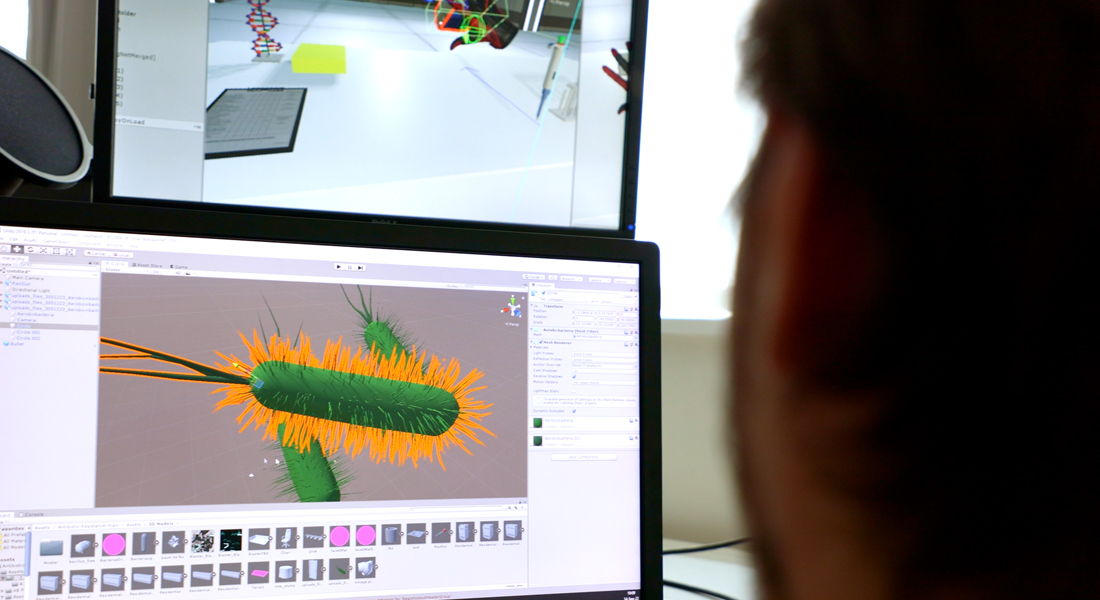Grants

On this page, you can read about the different grants that Virtual Learning Lab has received.
Collaboration between CoPSY, Virtual Learning Lab, ETH Zurich and Museum für Naturkunde Berlin.
The project is a collaboration between Robert Böhm from Copenhagen Personality and Social Psychology research group (CoPSY), Virtual Learning Lab, University of Copenhagen, EIT Zurich and Museum für Naturkunde Berlin. The aim of the project is to communicate the topic of herd immunity among people, who might be hesitant when it comes to vaccinating themselves, but might change their perspective when they understand the importance of creating herd immunity. The simulations will be implemented to increase engagement and empathy towards those who are too young, or have a compromised immune system, and therefore cannot be vaccinated.
A collaboration between the Department of Computer Science and Department of Psychology at the University of Copenhagen.
Virtual reality (VR) relies on the illusion that people believe virtual bodies to be their own, so-called body ownership. Yet, current measures of body ownership use simple statistical methods, and are based on subjective protocols developed for non-VR use. We combine methods from psychology and computer science to create new measures of body ownership. Total: 1,500,000 DKK VLL: 700,000 DKK.
Virtual Reality Safety Training in partnership with Maersk and SIMAC.
As part of the Energy Innovation Cluster, this project brings together Maersk Training, Virtual Learning Lab, Virsabi and Simac. The aim of this partnership is to establish proof of concept, for bringing simulation-based training offshore to the crew at Maersk Training with use of Virtual Reality. Not only focusing on skills training but soft skills combined with operational daily realities and scenarios. Thus, the project investigates how Virtual Reality can enhance the training of Maersk Training crews on 7 vessels, in new work processes, with the ultimate goal of improving safety, energy efficiency, operational performance, and environmental impacts. The project involves a fundamental shift, that will change how leaders manage, and how team members take on responsibility for their own tasks, but also for potential improvements in safety and energy performance. It is this shift we aim to support, by building a VR solution that will allow all members of crew to practice the required skills and behaviours in a simulated universe, where they can make mistakes and learn in a safe environment.
A collabation between ETH, University of Copenhagen, and Labster.
Eurostars is the largest international funding programme for SMEs wishing to collaborate on R&D projects that create innovative products, processes or services for commercialisation. Year: 2018-2021 Amount awarded: € 847 389 Granted by: the European Commission.
Virtual Reality Laboratory Simulations for Increased Productivity in the Biotechnology Industry.
Virtual Laboratory Simulations for Increased Productivity and Occupational Standards in the Biotechnology Industry The foundational technology for the project is a recent revolution in the development of virtual reality goggles as well as gloves with haptic feedback, that could allow a previously impossible task of cost-effective training of complex workflows. With the virtual reality technology we will create fully simulated versions of reality, offering training and development tools to simulate actual work-flows, processes and procedures. SIPROS is offering a new paradigm in training and development that currently is not on the market and is not possible for biotechnology industry to develop as it lies outside their core research and development capabilities. Granted by: Innovation fund Denmark Year: 2016-2020 Amount awarded: kr. 23.500.000.
